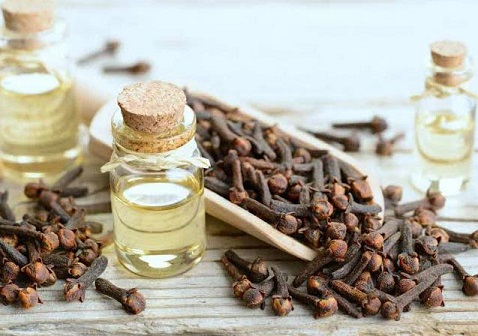Nikhil Prasad Fact checked by:Thailand Medical News Team Jul 31, 2024 1 year, 6 months, 3 days, 14 hours, 49 minutes ago
Thailand Herbs News: In a groundbreaking study, researchers from several esteemed institutions in Taiwan have uncovered new insights into eugenol, a compound derived from clove oil, which may offer significant benefits in preventing blood clots and treating cardiovascular diseases. This
Thailand Herbs News report dives into the exciting potential of eugenol as highlighted in a study recently published in a peer-reviewed journal.
 Study Finds That Clove Oil's Eugenol Prevents Blood Clots
Cardiovascular Diseases and Platelet Activation
Study Finds That Clove Oil's Eugenol Prevents Blood Clots
Cardiovascular Diseases and Platelet Activation
Cardiovascular diseases (CVDs) remain a leading cause of death globally, responsible for conditions like coronary artery disease, stroke, and hypertension. At the heart of these conditions lies the process of blood clot formation, where platelets, a type of blood cell, play a crucial role. Normally, platelets help stop bleeding by forming clots at injury sites. However, in CVDs, this process can become overactive, leading to dangerous blood clots that can block arteries and cause heart attacks or strokes.
What is Eugenol?
Eugenol is a natural compound found in clove oil (Eugenia caryophyllus). Known for its pleasant aroma, eugenol has been used for centuries in traditional medicine for its antibacterial, anticancer, and anti-inflammatory properties. Recently, researchers have been exploring its effects on human health in more detail, particularly its ability to modulate platelet activity and prevent blood clots.
The Study at a Glance
Researchers from Taipei Medical University, Fu Jen Catholic University, Shuang Ho Hospital, Cathay General Hospital, and Pondicherry University collaborated on this study to examine how eugenol affects platelet activation and blood clot formation.
Key Findings: Eugenol's Inhibitory Effects on Platelet Activation
In this study, the researchers focused on how eugenol influences specific signaling pathways involved in platelet activation. Platelets can be activated by various substances, such as collagen, which triggers a series of events leading to blood clot formation. The study found that eugenol significantly inhibits the activation of the NF-κB signaling pathway, a crucial player in inflammation and platelet activation.
Using a combination of immunoblotting and confocal microscopy techniques, the team demonstrated that eugenol reduced the phosphorylation of key proteins in the NF-κB pathway. This led to a decrease in platelet aggregation, the clumping together of platelets that forms clots.
Exploring the Mechanisms: cPLA2 and NF-κB Signaling
Further analysis revealed that eugenol also impacts the cPLA2 pathway. The enzyme cPLA2 is involved in releasing arachidonic acid, which contributes to platelet activation. The study showed that eugenol, along with a cPLA2 inhibitor, significantly reduced the activity of this pathway, further supporting its role in preventing platelet aggreg
ation.
Interestingly, the research highlighted that cPLA2 acts upstream of NF-κB, meaning it plays a role earlier in the signaling process that leads to platelet activation. By inhibiting cPLA2, eugenol indirectly prevents the activation of NF-κB, showcasing a dual mechanism of action.
Testing in Animal Models: Anti-Thrombotic Effects
To validate their findings, the researchers conducted experiments on mice. They used a model where platelet plug formation was induced in the mesenteric vessels of mice using sodium fluorescein. Mice treated with eugenol showed a significant reduction in platelet plug formation, indicating its potential as an anti-thrombotic agent.
The occlusion time, or the time it took for a blood vessel to become blocked by a clot, was substantially longer in eugenol-treated mice compared to those given a control treatment. This suggests that eugenol effectively prevents the formation of blood clots in living organisms.
Implications for Treatment: A Safer Alternative
Current treatments for preventing blood clots include medications like aspirin and clopidogrel. While effective, these drugs come with significant side effects, such as increased bleeding risk and, in some cases, rare but serious conditions like aplastic anemia. The discovery of eugenol's anti-thrombotic properties opens the door to potentially natural safer alternatives.
Eugenol's natural origin and its ability to inhibit platelet aggregation through multiple pathways make it a promising candidate for further development. It could provide a more effective and safer option for patients at risk of thrombosis, especially those who cannot tolerate existing medications.
Conclusion: A New Hope for Cardiovascular Health
The study underscores the importance of exploring natural compounds for medical applications. Eugenol, a compound with a long history of use in traditional medicine, is now showing promise in the modern fight against cardiovascular diseases. As research continues, eugenol could become a valuable tool in preventing and treating conditions caused by blood clots.
The study findings were published in the peer-reviewed journal Biomedicines.
https://www.mdpi.com/2227-9059/12/8/1689
For the latest
Thailand Herbs News, keep on logging to Thailand Medical News.
Read Also:
https://www.thailandmedical.news/news/herbs-for-covid-19-phytochemical-eugenol-extracted-from-cloves-could-be-useful-in-treating-covid-19-in-a-variety-of-ways
https://www.thailandmedical.news/news/polyphenol-rich-clove-extract-significantly-lowers-after-meal-blood-sugar-by-21-5%-in-healthy-people-and-by-27-5%-in-prediabetics
